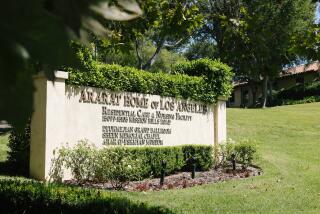Nursing Home Inspectors Step Up O.C. Enforcement : Health: More than 80 citations issued so far this year, up from 3 in 1992. Officials credit new staff, better training.
- Share via
FULLERTON — An 86-year-old nursing home resident, whose water container and emergency button were out of reach, eventually became so dehydrated he was admitted, semi-comatose, to an acute-care hospital.
A 98-year-old resident of the same Fullerton nursing home, Harbor Health Care, had difficulty begging for a drink because her tongue was so dry and her lips so cracked.
Many residents developed sores after being left in wet or soiled beds. One was found chilled after being left alone all night on the floor of a dining room with its patio doors open, his pants soaked with urine and his shirt covered with mucus.
These are just a few of the problems found earlier this year by state Department of Health Services inspectors and noted in their records. In response, the home was slapped with 11 citations in four months calling for thousands of dollars in fines--more than three times as many citations, in fact, as Orange County district inspectors issued in all of 1992.
Harbor, which has since has changed owners and is now complying with government regulations, was an extreme case, garnering more citations by far than any other skilled nursing home in the district this year. The previous licensee blamed the conditions on a trustee appointed by a bankruptcy court.
The stepped-up enforcement shows that inspectors in Orange County, accused just two months ago by an advocacy group of laxity, are making far greater use of citations and fines as a disciplinary tool.
After issuing only three citations for fines totaling $8,250 in 1992, Orange County inspectors wrote 56 calling for $96,800 last year and had logged more than 80 in 1994 as of Monday, according to state officials.
No one believes that the dramatic increase in citations signals a sudden decline in quality of care in the area’s nursing homes. But California Advocates for Nursing Home Reform, a San Francisco-based group that monitors nursing homes, argues it means inspectors are finally doing their long-neglected duty. “I don’t think it’s that the facilities have gotten worse,” spokesman David Seubert said. “I think it’s that (inspectors are) back doing their jobs again.”
In general, the recent dramatic leap in citations in the Orange County district is due to the staffing additions, improved training and better monitoring by supervisors in the district office, said Jacqueline Lincer, administrator for the Orange County district.
Only two months ago, regulators found themselves on the hot seat at a hearing conducted by a fact-finding panel, in which Seubert’s group accused them of falling behind the rest of the state in enforcement, based on the 1992 citation record. The panel, chaired by Assemblyman Gil Ferguson (R-Newport Beach), called on the state auditor general to investigate.
But state health officials said that by that time, the auditor general already had investigated and recognized the matter was under control. In fact, they said, they had never stopped doing their jobs, despite the small number of citations issued in 1992.
Lincer said that in 1992, the district’s citation level dropped off because it had an overwhelming caseload and it took on eight new evaluators in April who required training. But inspectors continued to issue what are known as “deficiencies” against nursing homes, a disciplinary tool that ultimately can lead to a facility’s financial ruin.
Both methods are used by inspectors, often simultaneously. Harbor, for example, was notified in February that it would lose its right to bill for Medicare or Medi-Cal patients--a financial debacle for most nursing homes--because of nine serious deficiencies. The termination was then rescinded in April after the facility passed an inspection, according to state records.
Marilyn Smith of Care Net-Fullerton, listed as one of the licensees during the time Harbor was having difficulties with the state, said the facility was supposed to be run according to state regulations by a trustee appointed by a bankruptcy court judge. The trustee could not be reached for comment this week.
Nursing home industry representatives say citations gauge little more than the district office’s staffing levels.
“I could literally track the department’s hiring by” the citation numbers, said Lori Costa, director of regulatory programs for the California Assn. of Health Facilities, a trade group representing 1,200 facilities statewide. “I can always tell because one of the first things (inspectors) learn is how to write a citation.”
Costa said her group considers Orange County one of the more rigorous offices--and not because of the number of citations it issues.
Of the state’s 16 districts, Orange County regulators issued the second highest number of deficiencies per inspection, behind the San Bernardino district, during the fiscal year ended in September, according to the latest annual statistics released by the federal Health Care Financing Administration. The rate was 27 deficiencies per inspection, compared to a statewide average of 22.
Deficiencies can range from minor violations, such as housekeeping problems, to more serious violations, such as endangering patients’ safety or rights. The district, with 72 homes, includes all public and private homes in Orange County and a handful of county-run facilities in Los Angeles County.
More than 4% of the district’s deficiencies were considered to be of a serious nature, problems that could cost a facility its Medicare and Medi-Cal certification. Again, only San Bernardino had a higher percentage.
Those numbers mean the county has been aggressively enforcing regulations, said Brenda Klutz, assistant deputy director of the state’s licensing and certification program.
Costa, of the California Assn. of Health Facilities, argued that it is the possibility of decertification that gets nursing home officials’ attention, not the cumbersome process of citations and fines, which can be subject to lengthy appeals.
“That enforcement mechanism is much more expeditious,” she said of decertification. “Providers get very nervous. It’s a very heavy hand. . . . It brings about results.”
Seubert, whose group tracks deficiencies, citations and complaints in an annual “report card” on nursing homes, agreed that decertification is a serious business, but argued it is so seldom applied that it is virtually an empty threat.
“These facilities are put on the decertification track, then the facility gets it together and mops the floor and then gets recertified. . . . Everybody knows you’re never going to get decertified,” he said.
Seubert said citations are imperfect too; only a fraction of the fines are ever collected. But he said they are “the best tool we have.”
State records show that of 14 homes with serious deficiencies in the fiscal year ended in September, the Orange County district decertified two facilities and restricted payments on two others. One home was denied certification on its initial application.
“If it’s not in compliance, we don’t just give it to them,” Lincer said.
Some homes, including Harbor Health Care, have risked decertification more than once.
The Fullerton facility was warned in early January, 1993, that it did not meet the requirements for certification. It was then notified less than two weeks later that federal regulators had reconsidered and determined the facility did meet the requirements after all. The following February, Harbor was in trouble again.
Lincer called Harbor “the exception, not the rule.” She said her office, which conducts both state and federal inspections, found Harbor “out of compliance” but was overruled by federal officials. That rarely happens, she said.
In general, state officials said, it does not matter what regulatory mechanism is used, as long as it works.
“The real measure (of effectiveness) is not the citations with fines,” said Margaret DeBow, the state’s deputy director for licensing and certification. “It’s whether the problem gets corrected. That’s really the best incentive we have.”
From a consumers’ standpoint, state officials said, the best way to evaluate a facility is to look through inspection reports--which are available at the nursing homes--not to add up deficiencies and citations. The reports explain the circumstances and context of inspectors’ findings.
Anyone with questions and complaints about homes and other health facilities in the Orange County district can call the office at (800) 228-5234.
More to Read
Sign up for Essential California
The most important California stories and recommendations in your inbox every morning.
You may occasionally receive promotional content from the Los Angeles Times.










